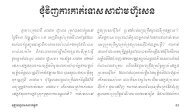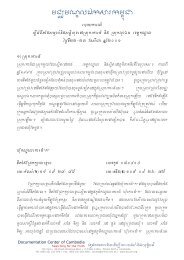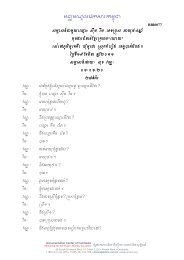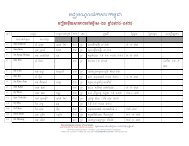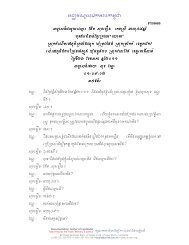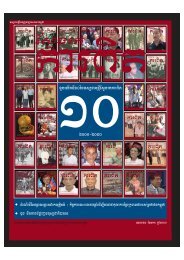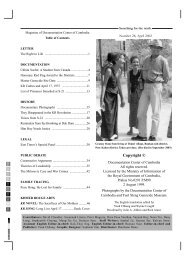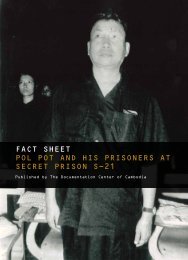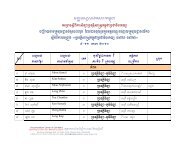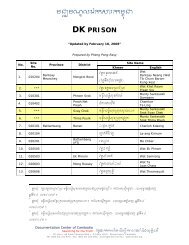Searching for the truth Issues 21 - Documentation Center of Cambodia
Searching for the truth Issues 21 - Documentation Center of Cambodia
Searching for the truth Issues 21 - Documentation Center of Cambodia
Create successful ePaper yourself
Turn your PDF publications into a flip-book with our unique Google optimized e-Paper software.
100 100 100 100 100 100 50 50 50 50<br />
Black<br />
Yellow<br />
Magenta<br />
Cyan<br />
Number <strong>21</strong>, September 2001<br />
inherently harmful to <strong>the</strong> evidence, but sometimes <strong>the</strong><br />
necessary legal details can become buried or <strong>for</strong>gotten<br />
in <strong>the</strong> course <strong>of</strong> narrative.<br />
The key to a good witness interview will be<br />
balancing openness with some measure <strong>of</strong> control. A<br />
potential witness is likely to be most <strong>for</strong>thcoming if<br />
<strong>the</strong> interviewer’s questions and demeanor convey<br />
sincere interest and build trust. Sometimes, potential<br />
witnesses will need to digress in order to recall events<br />
that happened long ago. However, <strong>the</strong> interview will be<br />
advised to provide subtle direction to <strong>the</strong> witness,<br />
keeping him or her relatively focused on <strong>the</strong> most<br />
helpful evidentiary in<strong>for</strong>mation. Below, I have<br />
provided a brief discussion <strong>of</strong> <strong>the</strong> types <strong>of</strong> in<strong>for</strong>mation<br />
that will comprise <strong>the</strong> most useful testimony.<br />
a. Whereabouts<br />
The first component <strong>of</strong> useful testimony will<br />
relate to <strong>the</strong> potential witness’s identity. Useful<br />
in<strong>for</strong>mation includes: (i) where he or she lived<br />
between April 17, 1975 and January 7, 1979; (ii) <strong>the</strong><br />
CPK zone, region, district and sub-district in which<br />
his or her village was located; (iii) whe<strong>the</strong>r he or she<br />
lived anywhere else during <strong>the</strong> DK period; (iv)<br />
whe<strong>the</strong>r he or she had always lived <strong>the</strong>re; (v) if not,<br />
why he or she went <strong>the</strong>re. If <strong>the</strong> potential witness was<br />
<strong>for</strong>ced to go to <strong>the</strong> village or cooperative in which he<br />
or she lived during <strong>the</strong> DK period, it will be useful to<br />
know (i) who <strong>for</strong>ced him or her to go <strong>the</strong>re; and (ii)<br />
what if anything was said to him or her during <strong>the</strong><br />
<strong>for</strong>ced relocation.<br />
b. Position<br />
A second useful area <strong>of</strong> in<strong>for</strong>mation will<br />
surround <strong>the</strong> position <strong>the</strong> potential witness’s position<br />
during <strong>the</strong> DK period. Useful testimony will include<br />
<strong>the</strong> following: (i) whe<strong>the</strong>r he or she worked during <strong>the</strong><br />
DK period; and (ii) if so, <strong>the</strong> nature <strong>of</strong> his or her<br />
occupation. If <strong>the</strong> potential witness worked <strong>for</strong> <strong>the</strong><br />
CPK at any time during <strong>the</strong> period, it will be useful to<br />
know (i) his or her exact position(s); (ii) his or her<br />
superiors <strong>for</strong> each such job; (iii) <strong>the</strong>ir superiors, if<br />
known; and (iv) how orders were given and received<br />
26<br />
<strong>Searching</strong> <strong>for</strong> <strong>the</strong> <strong>truth</strong> ⎯ Legal<br />
in his or her branch <strong>of</strong> <strong>the</strong> CPK.<br />
c. Criminal Acts<br />
Obviously, <strong>the</strong> most useful oral testimony will<br />
also include in<strong>for</strong>mation about criminal <strong>of</strong>fenses<br />
committed or observed by <strong>the</strong> potential witness. If <strong>the</strong><br />
potential witness ever tortured or killed someone,<br />
<strong>for</strong>ced someone to labor, imprisoned someone without<br />
a trial, took a child <strong>for</strong>cibly from his or her family, or<br />
persecuted anyone in ano<strong>the</strong>r fashion during <strong>the</strong> DK<br />
period, ideal testimony would include (i) a complete<br />
description <strong>of</strong> <strong>the</strong> act or acts; and (ii) why he or she<br />
committed <strong>the</strong> act or acts. If he or she was ordered,<br />
<strong>the</strong> prosecution will need to know (i) who ordered him<br />
or her to commit that act; and (ii) whe<strong>the</strong>r anyone<br />
higher up in <strong>the</strong> command chain was <strong>the</strong> origin <strong>of</strong> <strong>the</strong><br />
order. If no order was given, it will be useful to know<br />
(i) whe<strong>the</strong>r his or her superior (and <strong>the</strong>ir superiors)<br />
knew about <strong>the</strong> act or acts and, (ii) if so, whe<strong>the</strong>r his<br />
or her superiors punished him or her in any way.<br />
Naturally, a potential witness may also have<br />
useful in<strong>for</strong>mation about crimes committed by o<strong>the</strong>r<br />
persons. If <strong>the</strong> potential witness ever saw a member<br />
<strong>of</strong> <strong>the</strong> CPK torture or kill someone, <strong>for</strong>ce someone to<br />
labor, imprison someone without a trial, take a child<br />
<strong>for</strong>cibly from his or her family, or persecute anyone in<br />
ano<strong>the</strong>r way, <strong>the</strong> prosecution should determine (i) <strong>the</strong><br />
exact nature <strong>of</strong> <strong>the</strong> act or acts; (ii) exactly when and<br />
where <strong>the</strong> act or acts occurred; (iii) <strong>the</strong> identities <strong>of</strong> <strong>the</strong><br />
CPK members involved; and (iv) <strong>the</strong> positions <strong>of</strong> <strong>the</strong><br />
CPK members involved. If <strong>the</strong> perpetrators gave any<br />
explanations <strong>for</strong> <strong>the</strong>ir act or acts, <strong>the</strong> testimony should<br />
include (i) what <strong>the</strong>y said; (ii) whe<strong>the</strong>r <strong>the</strong>y had been<br />
ordered to commit <strong>the</strong> act or acts; and (iii) how <strong>the</strong><br />
witness acquired such in<strong>for</strong>mation. It will also be<br />
useful to determine whe<strong>the</strong>r <strong>the</strong> potential witness<br />
knows <strong>the</strong> identities <strong>of</strong> <strong>the</strong> perpetrators’ superior(s)<br />
and whe<strong>the</strong>r <strong>the</strong> perpetrator(s) were punished or<br />
reprimanded in any way. Again, <strong>the</strong> witness’s source<br />
<strong>of</strong> in<strong>for</strong>mation should be disclosed.<br />
(Continued in <strong>the</strong> October 2001 issue)<br />
<strong>Documentation</strong> <strong>Center</strong> <strong>of</strong> <strong>Cambodia</strong> (DC-Cam)



